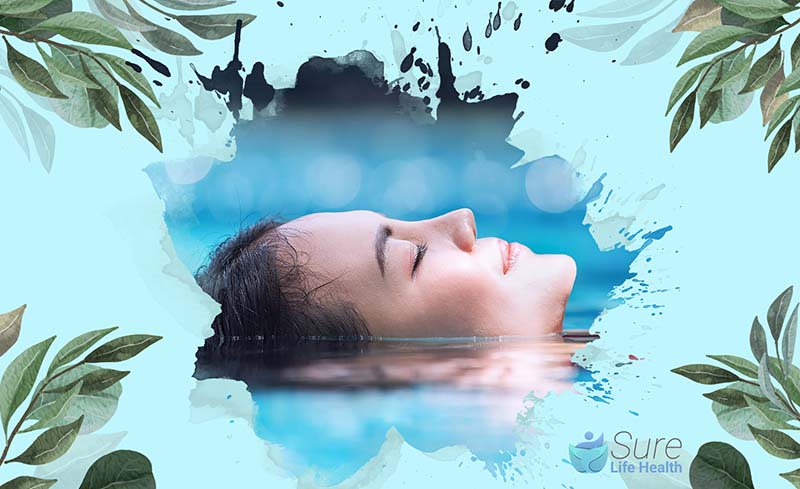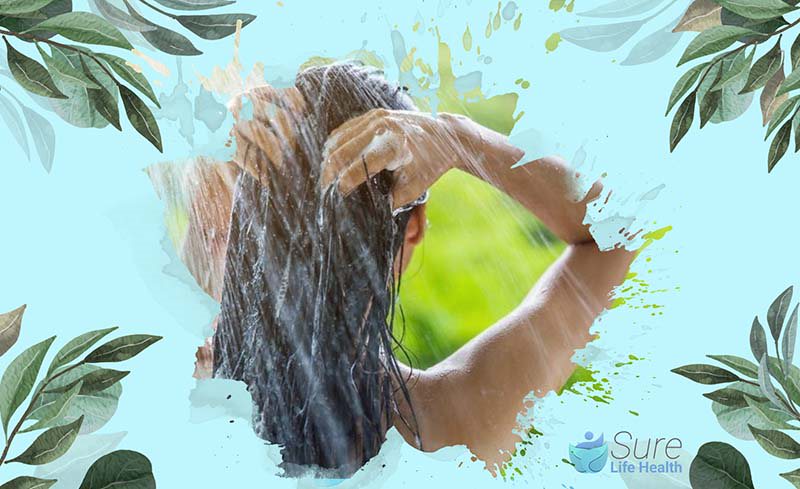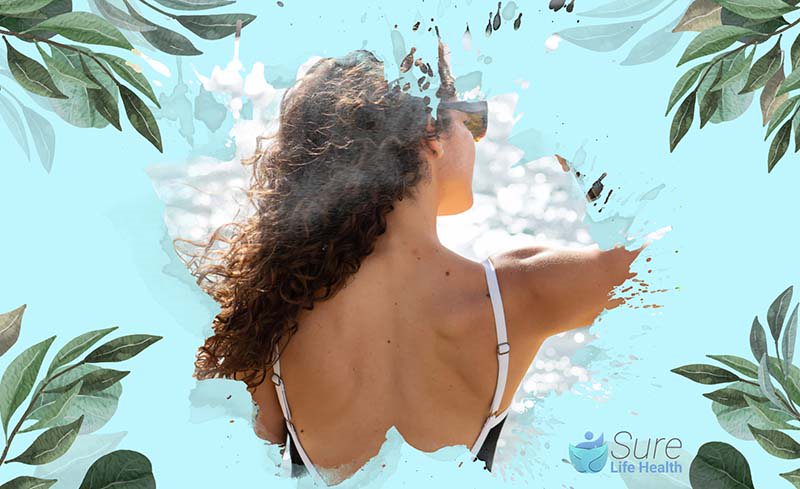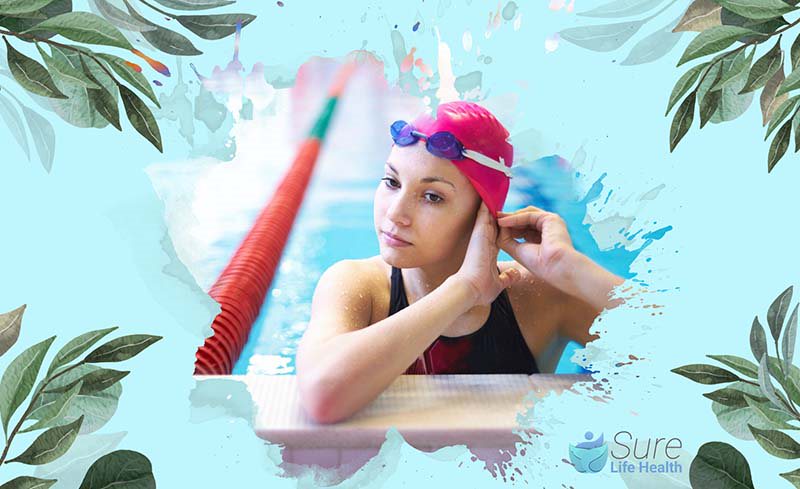Swimming is an excellent activity for staying active and enjoying yourself throughout the year. However, the chlorine used in swimming pools to maintain clean water can also be detrimental to your hair and skin. This chemical is effective at eliminating harmful germs, but it can also remove the natural oils that nourish your hair and skin. This often results in brittle, lackluster hair and skin that may appear red and feel itchy.
Fortunately, there are effective strategies for safeguarding your hair and skin against chlorine exposure. In this article, we’ll explore how chlorine impacts your hair, provide tips on how to protect your hair from chlorine, and offer advice on caring for hair that has already suffered chlorine damage.
Is Chlorine Bad for Hair?
Chlorine can be tough on your hair. When you swim in chlorinated pools, the higher levels of chlorine can dry out and weaken your hair, leading to breakage. While the chlorine in regular tap water is also present, its concentration is typically much lower and not usually harmful during regular showers.
However, the stronger concentration in pool water can be damaging, especially with frequent exposure. This makes it important to take steps to protect your hair when you’re swimming regularly.

What Are the Bad Effects of Chlorine on Your Hair?
Chlorine is used in swimming pools to kill harmful bacteria, but it can also do serious damage to your hair, especially if you swim often.
Chlorine removes the natural oils that your body produces to keep your hair healthy. This can lead to several problems for your hair, including:
- Making it brittle, causing it to crack and split
- Removing the natural moisture from your hair
- Fading your natural or dyed hair color
- Weakening your hair, which can lead to split ends
If you only swim occasionally, like during a yearly vacation, you might not notice much damage. However, the effects of chlorine can be more severe for people who swim more regularly or have certain types of hair, such as:
- Thin or fine hair
- Color-treated hair
- Bleached hair
- Chemically treated hair
- Dry hair
- Already damaged hair
For all swimmers, whether you hit the pool every day or just once a month, you should take steps to protect your hair from the harmful effects of chlorine, regardless of your hair type or color.
How to Protect Your Hair from Chlorine?
Discover the most effective strategies for safeguarding your hair against the harsh effects of chlorine. These methods aim to minimize the damage caused by exposure to chlorinated pool water:
Rinse Hair with Clean Water Before and After Swimming
Hair acts like a sponge, absorbing moisture from its environment. When dry, it’s particularly vulnerable to soaking up whatever it comes into contact with, and if you’re about to swim, that’s going to be chlorinated water.
Chlorine is harsh on hair; it can strip away sebum, the natural oil that nourishes and protects your hair’s outer layer, the cuticle. This leaves hair brittle and prone to damage.
The solution is simple: saturate your hair with clean water before entering the pool. This pre-saturation reduces the amount of chlorinated water your hair can absorb. Similarly, rinsing your hair with clean water immediately after swimming helps to remove any chlorine that it has absorbed, mitigating potential damage.
This principle isn’t limited to your hair—it also benefits your skin. Showering before entering the pool helps to protect both skin and hair from chlorine’s drying effects.

Use Natural Essential Oils Before Entering The Lake
Before diving into the pool, it’s wise to prepare your hair with a layer of natural oils. Applying a leave-in protectant that contains natural essential oils like coconut, olive, or jojoba oil can create a barrier that minimizes chlorine absorption.
These oils not only shield your hair from harmful chemicals but also keep it hydrated. For enhanced protection, complement this routine with a deep conditioning mask or a quality leave-in conditioner.
Apply Swim Spray
If you have blond or light-colored hair, you’re more likely to see damage from chlorine, like changes in your hair color. A swim spray can really help.
These sprays are made to shield your hair by stopping chlorine from getting into your hair. They work for all hair types and can make a big difference in keeping your hair looking good.

Use Specialized Conditioner
For those who prefer not to use natural oils, there is a wide array of specially formulated products designed to shield hair during swimming activities.
Apply a hydrating conditioner, preferably one that includes dimethicone, before entering the pool. This type of conditioner forms a protective layer around each hair strand, offering a robust defense against the chlorine.
After swimming, conditioning your hair with a deep conditioning mask or leave-in conditioner is essential. This step is important because it helps replenish moisture and prevent further damage to your hair.
Use a Swimming Cap to Protect Your Hair
Swimming caps are essential for anyone looking to safeguard their hair from chlorine, especially if you’re involved in competitive swimming.
They effectively block chlorine from making contact with your hair. To maximize protection, ensure the cap covers all your hair and that it’s worn over damp hair, which aids in slipping the cap on more smoothly.

How Do Swimmers Maintain Healthy Hair?
For those who swim only now and then, there’s little you need to do to protect your hair—wearing a swim cap to keep your hair dry from the pool water is enough.
However, if you swim regularly, such as daily or several times a week, take extra steps to care for your hair and skin. Chlorine can really dry out and damage your hair, so wash it out and use products that help remove chlorine and add moisture to your hair.
How to Fix Chlorine Damaged Hair?
Recognizing chlorine damage is the first step. This type of damage usually makes hair look very dry, frizzy, and constantly tangled.
If you notice these signs, consult with your hairstylist who can assess how bad the damage is and offer tips for protecting your hair while swimming.
For home treatment of chlorine damage, consider these tips:
- Start by using a clarifying shampoo to get rid of chlorine and other harsh chemicals in your hair. You can make a natural version with baking soda and apple cider vinegar.
- Keep your scalp moisturized. If you have dry or flaky skin on your head, it’s best to get advice from your doctor or hairstylist on the right products to use. At home, coconut oil is excellent for moisturizing dry scalp.
- To heal hair that’s really been hurt by chlorine, use a deep conditioning treatment twice a week. Also, apply natural oils like argan oil to your hair and scalp to help protect and restore them.
Conclusion
If you’re wondering how chlorine can simultaneously be a dangerous gas, a common pool cleaner, and also found in our drinking water, you are not alone. Chlorine is a highly versatile element utilized in many different contexts, but when it comes to hair care, it’s best to limit its contact with your locks.
Experts agree that the best way to protect your hair from chlorine is by reducing its exposure. Before diving into a chlorinated pool, it’s crucial to take preventive steps. Start by wetting your hair with clean water, then apply a leave-in conditioner to create a protective barrier. After swimming, make sure to thoroughly rinse your hair to eliminate any lingering chlorine. This routine not only helps keep your hair healthy but also minimizes damage from chlorine exposure.
Now, we want to hear from you! Share your own experiences and stories with us in the comments below. And don’t forget to explore more insightful blogs on nail care and health from Sure Life Health.
Professor Gaye Cunnane, PhD, MB, FRCPI
As the Director of Health and Wellbeing at RCPI, Professor Gaye Cunnane is at the helm of initiatives aimed at enhancing the health and well-being of RCPI Trainers and Trainees. Her role extends beyond administration; she is also a respected clinical professor of rheumatology and a consultant rheumatologist at Trinity College Dublin (TCD) and St James’s Hospital. Prof. Cunnane’s medical journey began at TCD, where she graduated from medical school, and her path has been marked by both clinical and academic excellence.
After completing her basic clinical training in medicine, she embarked on PhD studies at University College Dublin and St Vincent’s University Hospital. Her research during this period was focused on prognostic markers in early inflammatory arthritis, a project that saw her collaborating with esteemed universities across Europe, including in Switzerland, The Netherlands, the UK, and Sweden.
Prof. Cunnane’s career took her to the University of California, San Francisco, where she spent three years delving into research on new treatments for lupus. Her academic prowess led her to the University of Leeds in 2001 as a senior lecturer, before returning to Ireland in 2003 to assume her current roles. She has also served as the National Specialty Director for Rheumatology training in Ireland, Programme Director for Basic Specialist Training with RCPI, and as a past President of the Irish Society for Rheumatology.
PUBLISHED ARTICLES
“Rheumatic disease differentiation using immunoglobulin G sugar printing by high-density electrophoresis”: Published in The Journal of Rheumatology, this study reflects her in-depth investigation into rheumatic diseases.
“Benefits of exercise in patients with rheumatoid arthritis: a randomized controlled trial”: This research work, highlighting the positive impact of exercise on rheumatoid arthritis, underscores Prof. Cunnane’s dedication to practical, patient-centered research.
Additionally, Prof. Cunnane has made notable contributions to the Annals of the Rheumatic Diseases, discussing early referral, diagnosis, and treatment of rheumatoid arthritis. She has also been involved in a study on the NCBI platform investigating exercise benefits in rheumatoid arthritis patients.
Professor Gaye Cunnane’s career is a testament to her commitment to improving patient outcomes in rheumatology through rigorous research, clinical excellence, and dedicated teaching. Her work continues to influence the field of rheumatology, both in Ireland and internationally.

